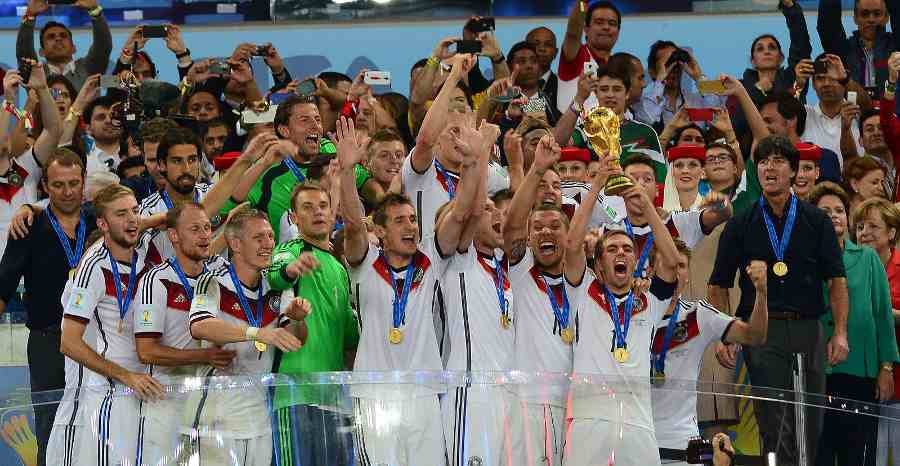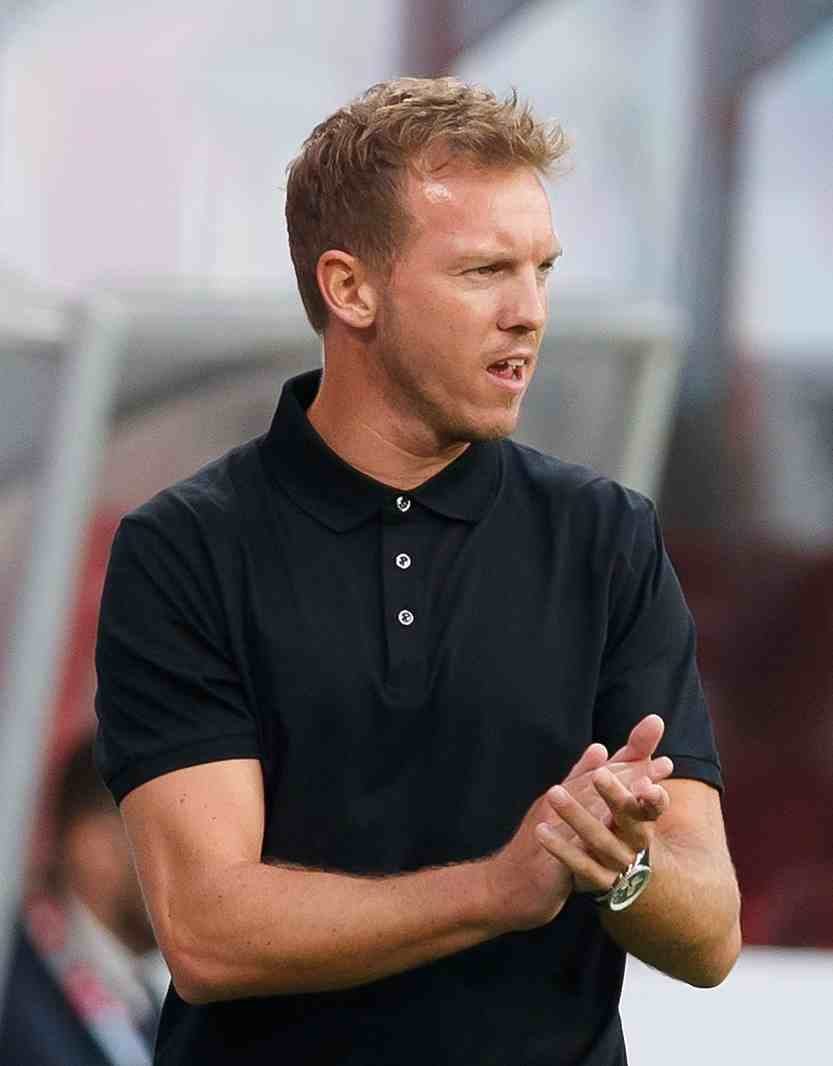Germany's Summer Fairytales: A Journey Through Football and National Identity.
More than just goals and victories: recounting a country's story through its iconic football moments. (For people who love ⚽ football and 📚 longreads).
In just a few days' time, the Euro 2024 football tournament hosted by Germany is over. It has been a surprising success. Despite the very German challenges of an inefficient railway system, capricious weather and relentless media scrutiny of every banner and symbol around the stadiums, the tournament has exceeded expectations. The German football team were knocked out by Spain in the quarter-finals, but in a way that made you want to hug them. The organisation and security worked smoothly and the general feeling was one of joy.
Yet there is an undeniable bittersweet note in the air.
Many were hoping for a revival of the Sommermärchen - those magical summer fairytales that hold a special place in the hearts of German generations.
For me, an Italian-German-European born in 1971, these football fairytales began with the 1990 World Cup, when Germany, in the midst of reunification, won the title. Then came the unforgettable 2006 World Cup, which transformed Germany's image from cold and bureaucratic to "Cool Germany" - a beacon of efficiency, friendliness and resilience - Italy won the tournament, but Germany won the hearts of football fans around the world. Finally: the triumphant 2014 World Cup in Brazil, the last time Germany celebrated an international victory.
At key moments in German history, these football events seemed to reflect and reinforce the hope, optimism and renewal of a nation. Where has it all gone? How did it all begin? And why is the word Sommermärchen so evocative when it comes to football in Germany?
Germany: Land of Poets and Thinkers, but also Miracles and Fairy Tales.
Deutschland: Land der Dichter, Denker, Wunder und Märchen.
It may seem strange to associate fairy tales with football. But this is Germany: a nation of thinkers and poets. The birthplace of European Romanticism. Folklore and legends here used to go hand in hand with an individualism rooted in reason and a reverence for nature that often bordered on pantheism.
Märchen" means "folk tale" in English: a perfect fit for the richer meaning of the German football dream, which resonates with the iconic fairy tales collected by Jacob and Wilhelm Grimm in the 19th century - stories like 'Hansel and Gretel', 'Cinderella' and 'Snow White'. Deeply rooted in German culture, these tales combine regional myths with universal themes. Similarly, major football tournaments take us away from our everyday lives for four weeks and immerse us in a world of tribal loyalties, passionate chants and shared dreams.
This is where the German fascination with the "summer fairy tale" comes in: the embodiment of both a collective desire and a frustration.
In a country often perceived as struggling with self-belief, anything that doesn't end in failure is quickly labelled a miracle (ein Wunder) or a fairytale (ein Märchen). This phenomenon reflects a national psyche in which exceptional success is attributed to an almost supernatural force. Like the Wirtschaftswunder in the German Fifties. When things go exceptionally well in Germany, it's as if you've entered the realm of the supernatural, where success feels like a magical stroke of luck.
And so it is with German football: every triumph feels miraculous, every summer a fairytale that writes itself into the nation's history.
These moments are more than victories; they're turning points, beginnings, endings, impressed on the collective memory. So telling the stories of these moments is more than just recounting football victories; it's a way of tracing the wider narrative of German history through the lens of these defining events. Follow me on this journey.
1954: The miracle of Bern and the reconstruction of the German soul.
Winning the 1954 World Cup is often remembered as the "real founding date" of the Federal Republic of Germany: well, maybe not in the academic circles, but that is how it was perceived on the streets and in West German homes.
After the Second World War, Germany was a nation in need of redemption and a new identity. The struggle to regain international prestige and national pride felt unbearable to many. But football proved to be a powerful tool for Germany to rehabilitate its image.
The 1954 FIFA World Cup, held in Switzerland, was the first international tournament to reinstate West Germany after its exclusion from all sporting competitions in 1945. It was also the first major sporting event to be televised live to several countries from Europe. In the context of a turbulent time, with the 1953 DDR uprising still fresh, the competition was a stage for East-West confrontation.
Entering the World Cup as underdogs, West Germany began their campaign with a win over Turkey, but soon suffered a crushing 8-3 defeat at the hands of tournament favourites Hungary. Defying expectations, the team progressed to the knockout stages, where they beat Yugoslavia and Austria before meeting Hungary again in the final.
Everyone, both in Germany and around the world, was bracing themselves for a German defeat. But in a stunning turn of events, West Germany secured the title with a 3-2 victory - a David vs. Goliath moment that electrified and uplifted the nation.
The victory helped massively to change Germany's international image, but more than that it brought back a sense of joy and national pride. Scenes of celebration in Bern, with cheering crowds hosting coach Sepp Herberger and key players onto their shoulders, captured the mood of the nation. On the team's return journey from Switzerland, enthusiastic crowds greeted them at almost every station. It was a new beginning: a victory for which there was no shame.
The "Miracle of Bern" marked the beginning of Germany's gradual reintegration into the international community: the sporting achievement was a door-opener for a country still occupied by the Allies (who left a year later, in 1955). The mood of the time was summed up by the slogan:
“Wir sind wieder wer”,
"We are somebody again"
1974: The silent triumph of West Germany and a East-West match that made history.
The 1974 World Cup, hosted by West Germany, was intended to showcase the country's economic recovery and political stability, projecting an image of a progressive, peaceful nation ready to rejoin the global community.
It was a challenge at a time when there were major issues beyond football. A few months before the World Cup, Chancellor Willy Brandt resigned after it was discovered that one of his closest aides was an East German spy. Meanwhile, the RAF was becoming a more radical terrorist organisation. After the military coup in Chile in 1973, waves of solidarity spread through Europe and Germany's squares and stadiums. Finally, the dark shadow of the 1972 Munich Olympics massacre: West German security failed then to protect Israeli athletes, raising huge security concerns about hosting the World Cup in Germany.
All these factors made the 1974 tournament anything but the intended summer fairytale. To avoid political problems, efforts were made to minimise national fanfare: German flags were not draped over car roofs and the national anthem was sung in silence. The weather didn't help either, as it rained day and night throughout the tournament: it rained during the group games, the quarter-final, where Germany beat Sweden 4-2, and the semi-final. The German team's training camp in Malente, in the northern region of Schleswig-Holstein, was no exception: a vast expanse of mud.
In 1974, Germany won their second World Cup title with a 2-1 victory over the Netherlands. The match is famous for the brilliance of the Dutch team, led by Johan Cruyff, who later remarked: "They didn't win, we lost”. The Dutch were tactically superior, but the German team, with players such as Bernd Hölzenbein, Gerd Müller, Franz Beckenbauer and Sepp Maier, and a good dose of luck, triumphed.
I was a child in the seventies, living not far from Trieste: my father, a football fanatic, showed us dozens of 8mm films celebrating the total football of Cruyff and his team and, of course, the highlights of that incredible match in which the Netherlands went out as losers and Germany became a legend to be beaten.
But there was one more thing to remember from that rain-soaked World Cup.
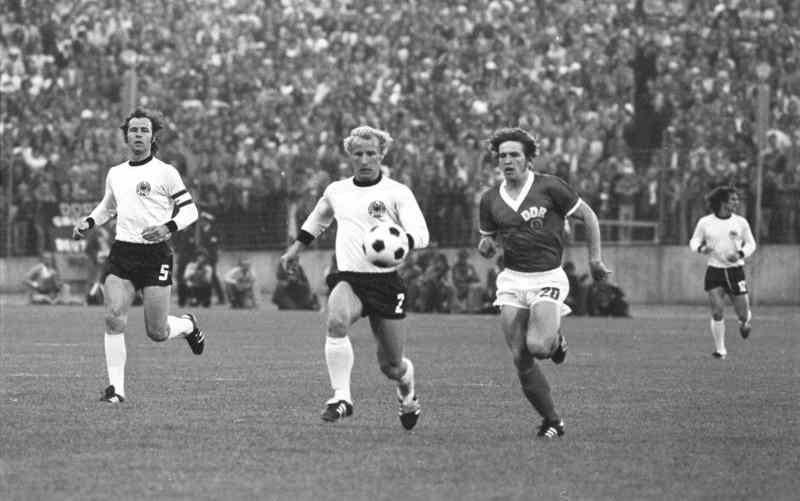
One match stood out and was remembered even more fondly than the final: on 22 June 1974, another miracle took place when East Germany, in their only World Cup appearance, overcame West Germany 1-0. The defeat of the "class enemies" was the greatest moment in East German football history, but it was also a blessing in disguise, as it allowed West Germany to avoid a tougher group with Brazil, Argentina and the Netherlands. Fifty years on, the memory of that event is charged with a mixture of nostalgia, new-found pride and reconciliation with the past. Here is my account of that event and how we re-enacted it last weekend: 👇
One goal for history: the one time when East Germany beat West Germany.
It's a crisp Sunday evening in July, and about a hundred of us are sitting on improvised tribunes outside the Gropius Bau, one of Berlin's hippest museums. But we're not here for an art exhibition. We're about to watch something very special - a football match like no other.
1990: when Germans were the happiest people on earth.
"Geht's raus und spielt's Fussball." (Let's go out and play football)
Franz Beckenbauer, to the German Team, before the final against Argentina.
That summer was a fairytale for both Germany and Italy. In Italy, a fabulous and carefree decade was coming to an end, with economic growth making the country the fifth largest economy in the world. Corruption in Italy was enormous and the bubble would burst shortly afterwards, but at that moment it didn't matter. In Germany, the Berlin Wall had fallen eight months earlier and a new Germany, in a new Europe, was about to emerge. Hope was in the air.
We were all excited and naive.
But how could we not be?
Those days overlap with my biography. I was finishing my high school education when the World Cup kicked off and preparing for my State “Maturity Diploma” exam, which took place the day before the final on 8 July. Way more important than crossing with my personal bio, West Germany's journey to the World Cup intersected with the final stages that brought German reunification to completion in record time:
One month before the World Cup started, the "Two-plus-Four Conference" of foreign ministers (the four Allied plus the two Germanies) met in Bonn on May 5 to discuss the foreign policy role of a united Germany.
On July 1, when West Germany beat Czechoslovakia in the quarter-finals, the Federal Republic of Germany and the German Democratic Republic entered into an economic and monetary union: the D-Mark replaced the DDR Mark.
The 1990 World Cup team was still a West German team, full of names that remained in global football history — Matthäus, Brehme, Völler, Klinsmann, Buchwald. The DDR national team had missed out on qualifying for the World Cup in Italy against Austria just six days after the fall of the Berlin Wall.
The German team started the tournament with a deserved 4:1 win over Yugoslavia on June 10th. With another dominant win over the United Arab Emirates and a draw against Colombia, Germany secured their place in the last 16 as group leaders. The Round of 16 against the Netherlands and the Quarter Finals against the Czechs were much more arduous. There was less optimism about the semi-finals against England. This match was decided by the unpredictable lottery of the penalty shootout. Germany won.
The final match of the 1990 World Cup took place on 8 July at the Stadio Olimpico in Rome, in front of 73,600 spectators in the stadium and 28 million viewers across West and East Germany. While the game itself might not be remembered as a football classic, it was a tense and dramatic affair, remaining goalless until six minutes before the end. The turning point came when the referee awarded a penalty to Germany. Andreas Brehme confidently converted the spot-kick securing a 1-0 victory for West Germany.
Even the German team seemed initially surprised by their triumph. Archive footage shows team boss Franz Beckenbauer walking alone across the pitch in Rome after the award ceremony, a gold medal around his neck, arms crossed, in a moment of silent reflection. Nobody knew where his mind was in those momemts, but his words at the media conference the next day resonated worldwide:
"Now the players from East Germany will be added to the mix. I believe that the German team will be unbeatable for years to come. I feel sorry for the rest of the world, but we will be unbeatable for years to come."
What a sentence, huh? Such bold declarations placed a heavy burden on his successors. In both football and life, invincibility is an illusion, and things unfolded differently later. Germany faced tough challenges in the following years, notably being defeated by Denmark in the final of the 1992 European Championships.
But this moment of arrogance can be forgiven. It was a reflection of the overwhelming emotion and unprecedented optimism of the time - a feeling that has never quite returned in the same way in German history.
The special summer of 1990 has become part of German culture, depicted in films, books and songs. Among my favourites is the cult German film "Go, Trabi, Go" (1991), which follows the adventures of an East German family travelling to Italy in their Trabant car after the fall of the Berlin Wall. They arrive in Rome just in time to hear from afar the cheering crowds celebrating the success of the German team. The Italian Summer of 1990 also became part of the third installment of the monumental trilogy "Heimat" by Edgar Reitz. In the second episode of Part III, the family watches the games while renovating their old home and planning their post-reunification future.
But it was the Italian song written by Gianna Nannini and Edoardo Bennato for the 1990 World Cup that stayed in the hearts of the Germans and became their football anthem for every future event: Un'estate italiana (“An Italian Summer”). Here in Germany we know it as Notti magiche (inseguendo un goal) (“Magic nights, searching for a goal”), one of the verses of the refrain.
When the master of Italian rock melodies, the magnificent seventy-year-old Gianna Nannini, comes here to Germany - filling stadiums and theatres - she is reluctantly forced to sing it again every time, in a triumph of fifty-year-olds like me who stand up and sing, often with tears in their eyes (again, like me).
2006: "Cool Germany" becomes a brand.
The destinies of Italy and Germany were once again intertwined in a new Sommermärchen, this time with Germany as host and Italy as victor.
In 2006, Germany was governed by a grand coalition led by Angela Merkel. The country was emerging from a difficult period; in the 1990s, post-reunification Germany had been dubbed the 'sick man of Europe'. But for the first time since 2005, there was a palpable sense of development rather than crisis, thanks in large part to a new, solid and reassuring Kanzlerin - the first woman to lead Germany. It was the beginning of a new era.
2006 was Germany's long-awaited opportunity to turn the page and reveal a new identity: modern, progressive, patriotic, yet inclusive. It was a time when the illusion of building a multicultural society sustained by prosperity was still alive. Indeed, things were getting better. In 2006, Germany's GDP grew by 4.4%, almost three times as fast as the previous year. These were truly brighter times.
Germany welcomed fans from all over the world as "guests of friends". Unlike 1974, the weather cooperated and Germany enjoyed four weeks of sunny skies and mild temperatures. Germany surprised the world (and itself) by being an excellent host. The sea of black-red-yellow flags, which for the first time in decades could be waved proudly and without guilt, did not bother anyone, neither locals nor guests. Patriotism was sweet in 2006.
Recently, some commentators have tried to link the development of right-wing movements to the re-emergence of the German flag eighteen years ago: nonsense.
It was a relaxed patriotism, an expression of a country that was happy and at ease with itself. Thousands of tourists also took the opportunity to buy German flags and other Made-in-Germany memorabilia. The Cool Germany brand was born that year. What a time!
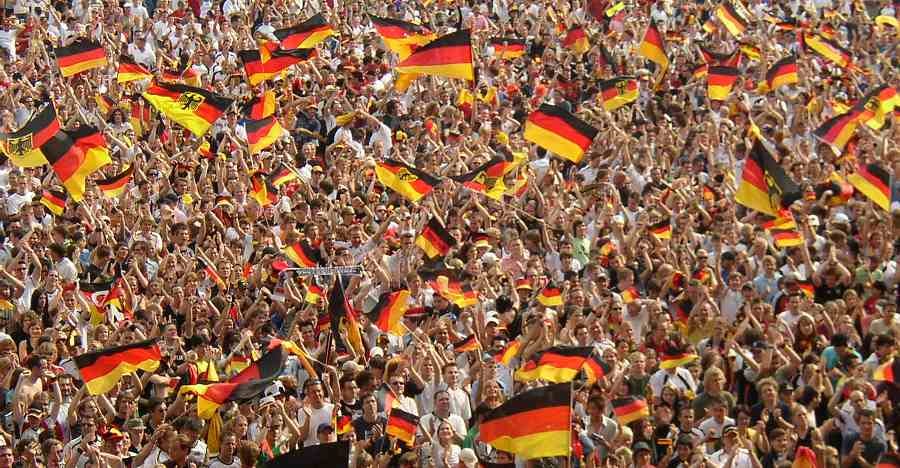
It was a summer fairytale on the pitch too. After defeating Sweden in the Round of 16, Germany faced Argentina in a tense quarter-final that was decided on penalties after a 1-1 draw in extra time. Jens Lehmann was the hero of the day in the German goal. Known for keeping a 'cheat sheet' in his right sock, Lehmann had noted the preferences of Argentina's shooters. This cheat sheet became legendary, and although in 2024 we have seen similar notes on the back of goalkeepers' water bottles, Lehmann's right-sock method remains unsurpassed. He saved two penalties and led his team to the semi-finals.
There, Germany faced Italy in a match that will live in the memory of almost everyone. Italy's defence, led by Fabio Cannavaro, was an insurmountable wall. Germany held firm until the 119th minute, when Fabio Grosso and Alessandro del Piero scored two goals within a minute of each other. The dream of a second title on home soil after 1974 was shattered. For Germany, the tournament ended with the third-place play-off, which they won 3-1 against Portugal.
Going into the final, German fans were in no doubt as to who to support: Italy were the darlings of the host nation. The chant Berlin, Berlin! Wir fahren nach Berlin! (Berlin, Berlin, let's go to Berlin!) became Berlino, Berlino, andiamo a Berlino!
The match ended with an infamous moment: in the 110th minute, French great Zinedine Zidane lost his temper after constant provocation from Italy's Materazzi and head-butted him in the chest, earning him a red card. In the ensuing penalty shootout, Italy emerged victorious, lifting the trophy in Berlin's azzurro-painted Olympic Stadium.
A few years later, rumours circulated that the German Football Association had paid millions of euros to FIFA in order to secure the World Cup in Germany. Legal disputes are still ongoing, but with everything that has happened since (see: Qatar 2022), perhaps it is time to let it go.
2014: a summer dream before the storm.
In 2014, Germany was still under the leadership of Angela Merkel, now known as the Krisenkanzlerin, the “crisis chancellor”. Merkel's role resembled that of a staunch goalkeeper, focused not on driving the team forward but on protecting it from external threats. Amid the geopolitical turmoil of the Euromaidan and the occupation of Crimea from January to March 2014, Merkel's protective umbrella shielded Germans from fully grasping the tensions boiling up. Even when the 2014 Gaza war erupted in the final week of the World Cup, the nation's attention remained fixated on football, not world news.
In retrospect, the summer of 2014 was like a brief dream before an upcoming nightmare. A year later, we were caught up in the migrant crisis. Germany's optimism and triumphs, both on the football pitch and as a nation, began to fade. The far-right parties, in Germany and across Eastern Europe, were starting their march to power.
Germany's fourth World Cup victory in 2014 is arguably the most well-documented in history. It was a tournament full of highs and lows, captured in interviews, documentaries, highlights, podcasts and social media memories. Germany made a strong start in the group stages, followed by a tactical approach in the knockout rounds. They overcame Algeria in extra time and secured a narrow 1-0 victory over France.
All of which led to an unforgettable semi-final against Brazil that exceeded even the most optimistic German expectations on the 8. July 2014. The 7-1 goleada was a moment of national euphoria, but also a reminder of the cautious understatement that commentators and politicians, ever mindful of Germany's complex past, would have recommended.
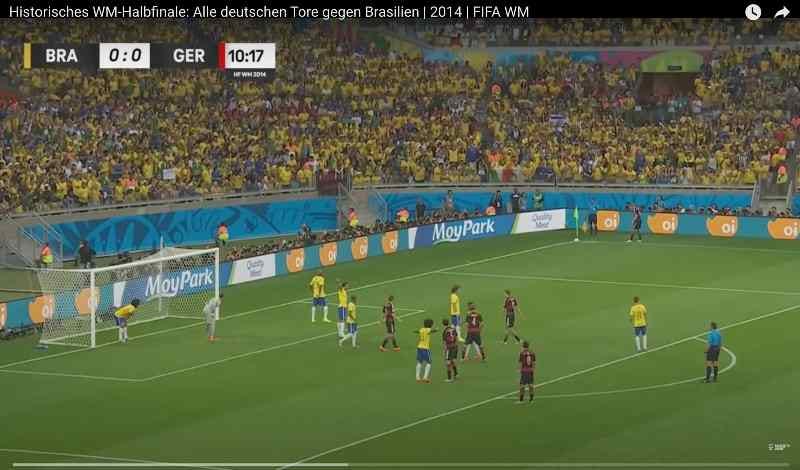
Brazil, the world's most passionate football nation, was electrified by the prospect of hosting the 2014 World Cup. They were determined to win the title. Their style of play at the tournament was almost fanatical - all-out, all-out attack. But they were also blinded by euphoria and lacked defensive solidity. The Germans knew this and were perfectly prepared, knowing exactly where to attack.
50,000 people in the stadium, 35 million TV viewers in Germany and a billion worldwide couldn't believe their eyes as the game unfolded. Thomas Müller gave Germany the lead after eleven minutes. Then Miroslav Klose, Toni Kroos (twice) and Sami Khedira scored four goals in six minutes for the DFB team to make it 5-0 at the break. Simply unbelievable.
Trainer Joachim Löw pulled the euphoria plug during the break in the cabin:
“If anyone thinks they have to make a fuss now and show off their opponents, I'll change them immediately and they definitely won't be on the pitch for the final."
The final score was 7-1, and the Germans celebrated a historic victory. But under the watchful eye of their trainer, they behaved with dignity and fairness, not to humiliate Brazil. That was appreciated. When the German team returned to their camp, the Brazilians stood applauding and showing respect. One week later, on 13 July 2014, when arriving at the stadium for the final, all Brazilian fans cheered for Germany and supported the team against Argentina. It was the greatest and final happy ending for the team coached by Joachim Löw.
Today, tomorrow.
When asked a week ago whether the summer of 2024 could be considered a new summer fairy tale, most respondents expressed annoyance at the debate. Times have changed. No one seems to be expecting a summer fairy tale anymore. Realism has prevailed, and the mood in Germany is rather downbeat at the moment. The German engine is almost at a standstill. Like everywhere else, society is fragmented and nobody feels able to predict the future. It's not the best time, it's true. But Football 2024 has taught some lessons that can foster reasonable, well-founded hope in this country.
After 2023, the worst international year in Germany's history, there is now a team that deserves respect and applause. The result of the game against Spain could have been very different. Germany played good football, often better than Spain. The team, which has already been renewed, will be renewed again in the coming months. On average, it was the oldest team at this European Championship, but with one of the youngest - and most attentive and sincere - coaches.
Julian Nagelsmann, 36, fought back tears as he delivered more than just statements at his final press conference. He had a message not just for the football nation, but for the nation as a whole. He had a wish for this country:
"that we understand that it simply works better if I help my neighbor cut the grass. He'll be done quicker than if he does it on his own. If we always fall into a state of gloom, everything is grey, everything is bad, then nobody will improve. That's true in football and it's true in normal society."
„dass wir verstehen, dass es einfach besser geht, wenn ich meinem Nachbar helfe, die Hecke zu schneiden. Dann ist er schneller fertig, als wenn er es alleine macht. Wenn wir immer nur in Tristesse verfallen, alles ist Grau, alles ist schlecht, dann wird sich keiner verbessern. Das gilt im Fußball und das gilt in der normalen Gesellschaft“.
Perhaps this is what Germany needs for its future: to stop chasing the dream of a summer fairytale and to rebuild just a normal society − in life and sport.





